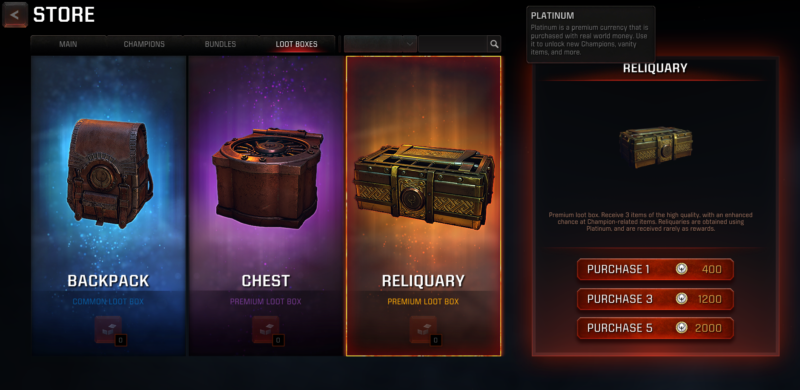
The Entertainment Software Rating Board (ESRB) today announced that all physical, boxed games that contain in-game purchases will include a label notifying purchasers of that fact "in the near future." The new program expands on a similar "digital purchases" label that already appears alongside the ratings for exclusively downloadable games that appear on some digital storefronts.
The "in-game purchases" label will appear on the box right by the game's letter rating, nearby but separate from existing content descriptors such as "Intense Violence," "Nudity," and "Strong Sexual Content." The label will be applied evenly to all games that include any additional content to be purchased, including "bonus levels, skins, surprise items (such as item packs, loot boxes, mystery awards), music, virtual coins and other forms of in-game currency, subscriptions, season passes and upgrades (e.g., to disable ads)," the ESRB said in a press release.
The ESRB's move comes as multiple state legislatures have begun looking into regulation of the randomized in-game purchases known as loot boxes. Earlier this month, Senator Maggie Hassan (D-N.H.) sent an open letter to the ESRB to examine whether games with loot boxes are being marketed "in an ethical and transparent way that adequately protects the developing minds of young children from predatory practices." Hassan said at the time that Federal Trade Commission action may be necessary if the game industry does not take steps on this issue.Despite this, the new in-game purchase label doesn't differentiate between those kinds of loot boxes and other kinds of downloadable content. That's in part because "a large majority of parents don't know what a loot box is," ESRB President Patricia Vance told Ars in a recent conference call, citing ESRB consumer research on the matter.
Even when parents are told what a loot box is, she added, "we found the primary concern by far is children spending money." Thus, Vance said, "it's very important for us not to harp on loot boxes per se, but make sure we're capturing loot boxes but also other types of purchases." To this end, a newly launched ESRB website at ParentalTools.org is intended to help explain the ratings system in more detail and give parents information on how to set up parental controls on popular gaming devices.
"Parents need simple information," Vance continued. "We can't overwhelm them with a lot of detail. We need to be clear, concise, and make it easy for them. We have not found that parents are differentiating between a lot of these different mechanics." Vance also noted that the ESRB's research found nine out of ten parents required children to have permission before making any in-game purchase, suggesting that a general warning would help "the vast majority of parents out there."
Still not “gambling?”
Though many have compared in-game loot box purchases to gambling, Vance said the ESRB's position against that characterization hasn't changed. "We think [loot boxes are] a fun way to acquire virtual items for use within the game, to personalize your experience," she said. While "obviously there's an element of surprise in loot boxes, just like with baseball trading cards," the ability to complete games without buying loot boxes, and the lack of an in-game method of "cashing out," both cut against the gambling descriptor, Vance argued. (Loot box items can often be resold for store credit via the Steam Marketplace and through outside third-party services, however.)And while legislators and others have raised concerns about the "predatory" psychological effects loot boxes can have on young people, Vance said the ESRB has been "unable to find any evidence that children specifically have been impacted by loot boxes or leading them to some sort of tendency towards gambling. We really truly don't know of any evidence supporting those claims."
"Whether this random reward structure leads to harmful purchasing/playing behavior is still up in the air, as it is so new and has yet to be investigated empirically," Chanel Larche, a doctoral candidate at the University of Waterloo's Gambling Research Lab, told Ars in December. "It is way too early to speculate how players may experience these rewards or the cognitive and behavioral consequences, be they positive or negative, that some players may undergo from purchasing loot crates."
In December, Apple began requiring games listed on the iOS App Store to reveal the odds associated with any in-game loot box purchases. A 2017 Chinese law imposes a similar requirement for online games sold in that country. Vance said the ESRB isn't taking any action on loot box odds at this time, but the organization is "going to continue to evaluate what additional measures we can take."
Though Vance said the new label was an "effective response" to concerns raised by legislators and parents, she stressed numerous times that further efforts from the ESRB on these issues could be coming. "This is a couple of steps forward," she said. "We'll continue to work with the industry to make sure there are disclosures about in-game purchases in general and loot boxes specifically... This is just a first step. We are going to continue to look at this issue... and at additional guidelines we can put in place."
[Update: The ESRB has offered a lengthy, written response to the specific concerns of Senator Hassan, noted above. "We believe that the combination of upfront disclosures about the availability of in-game purchases combined with activating parental controls is a quick and effective way to address the concerns you have raised," the response reads, in part.]
reader comments
209